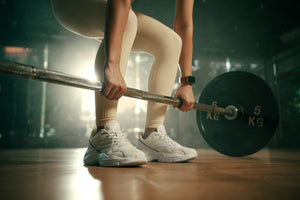Fasting (intermittent fasting, that is) is all the rage these days in health and fitness. And, it’s easy to understand why, when you hear such astounding benefits attributed to fasting, such as:
- Increased energy
- Greater mental clarity
- Better insulin sensitivity
- Increased fat burning
- Increased lifespan
As the popularity of fasting, and all its iterations, has grown, so too have the number of questions surrounding its practice.
One of the most common questions regarding fasting, particularly from those who hit the gym frequently is, can you still build muscle when training fasted?
Today, we’ll answer precisely that.
Let’s get started by first answering another question.
What is Fasted Training?
While most people think that being fasted simply means that they no longer have the sensation of being full, that’s not technically correct. Having the feeling of any empty stomach might mean you are fasted, but isn’t a 100% guarantee.
The reason for this is that depending on the size and composition of your meal, it can take up to 5-6 hours to completely digest a meal.[1]
So, while you may feel like you have an empty stomach a few hours after eating a meal, your body is still digesting, absorbing, and utilizing the nutrients from that meal.
In a physiological sense, fasted typically means that insulin levels have returned to their baseline values and the body is no longer digesting and absorbing nutrients.
Since most people don’t have the desire or capability to do blood work daily to see when their insulin levels return to baseline following a meal, most prefer to workout first thing in the morning as the 7-8 hours of sleep provides ample opportunity to fully digest and absorb the nutrients from your last meal and allow insulin to return to resting levels, ensuring that you are in a fasted state.
Is It OK to Train Fasted?
For the vast majority of people, yes, it is ok to train (or do just about anything else) fasted. Just realize that the quality of your workout may suffer depending upon the length and intensity of your workout.
If your typical workout consists of just some light cardio or a 30-minute circuit of machine-based exercises, whether you train fasted or not isn’t going to make a hill of a bean’s difference.
However, if you engage in strenuous exercise for more than 60 minutes using a lot of compound exercises and free weights (squats, bench press, deadlifts, etc.) while simultaneously pushing yourself to the limit each set, then you will likely want to have some type of nutrition before or during training.
The reason for this is simple -- food is fuel.
When you go into a workout fasted, you’re relying on stored glycogen and fatty acid oxidation to power you through your workout.
Now, if you’re training first thing in the morning immediately upon waking, fasted training likely won’t be too difficult, but it can take a couple of weeks to get accustomed to. However, if you typically fast all day and then try to train fasted late in the afternoon, you’re likely going to experience significant difficulty in maintaining a high level of performance the deeper you get into your workout.
If you do decide to train fasted, know that how much food you’ve eaten the day before (as well as its composition) will play a fairly prominent role in your performance during the subsequent workout.
If you had eaten plenty of calories, along with ample carbohydrates and protein, your glycogen stores will be topped off and you’ll have sufficient energy to tackle your workout first thing in the morning.
However, if you were “off” of your healthy eating plan and/or didn’t consume enough carbohydrates, you may find it difficult to sustain performance, focus, and power during your fasted workout.
You also need to take individual differences into account as well with fasted training.
Some people enjoy working out fasted first thing in the morning and feel that they can train at a higher level of intensity when they don’t feel like food is “weighing them down.” On the flip side, you have the fitness enthusiasts who feel incredibly weak when training fasted.
If you are interested in training fasted, take a few weeks to test the waters and see how you like it.
Now, for the big question...
Can You Build Muscle Training Fasted?
Yes, it is possible to build muscle even while training fasted.
The reason for this is the building muscle isn’t entirely dependent on whether or not you have food in your system while you’re training at the gym. The process of building, repairing, and breaking down muscle tissue isn’t that fast-acting.
Whenever we think about changing our body composition, be it building muscle or losing fat, we need to take a step back and think about things more globally, meaning we need to look at things from a perspective of weeks and months, not hours and days.
Building muscle requires three key things:
- Consume adequate dietary protein (0.8-1 gram per pound of bodyweight)
- Consume enough calories each day
- Progressively overload your muscles with a sufficient amount of volume
Do those three things and you will build muscle.
Also, notice how “you must train in a fed state” isn’t on that list.
That’s because when you eat is secondary to how much you eat of which macronutrients.
In other words, total calories and the composition of those calories will have a far bigger impact on your ability to build muscle and strength than when you ate those calories or if you trained fasted or fed.
Now, that being said, while you can build muscle when training fasted, it may not be the most optimal thing to do if your goal is to build as much muscle and strength as quickly as possible.
The reason for this is that research demonstrates that fasted training increases the rate of muscle protein breakdown.[2]
And, since building muscle ultimately boils down to muscle protein synthesis outpacing muscle protein breakdown over the long-term, doing anything that tilts the balance more towards breakdown and away from anabolism (like fasted training) is only making it harder on yourself to build muscle as quickly and efficiently as possible.
Due to the heightened state of protein breakdown following intense exercise, it’s pretty pertinent to get some protein in your body as soon as the workout ends.[3] Doing so will halt catabolism and initiate protein synthesis.
If you do train fasted first thing in the morning and then wait until the late afternoon to eat any food, you almost certainly leaving some gains on the table and hindering your ability to build as much muscle as possible.
Now, the protein you eat following your workout can either be in the form of whole food (chicken, eggs, beef, etc.) or protein powder, such as whey protein, which is our preferred protein powder of choice. checkout our full range of protein HERE
Protein is a macronutrient that is essential for recovery and muscle building. Protein Shake is a very convenient and a fast way to get your protein in. Drink it immediately post workout to start the recovery process. Also helps with sweet cravings while dieting.
Additionally, as we mentioned above, training fasted does take some getting used to, especially if you are someone who is used to training relatively soon (1-2 hours) after eating.
While you’re waiting for your body to adapt to training fasted, your workouts will suffer, which means you’re not creating the overload necessary to force your muscles to adapt and grow bigger and stronger.
Finally, there’s no special advantage to training fasted. You won’t build muscle any faster than if you had had a meal before training.
All of this isn’t to dissuade you from training fasted. If it works for you and you find that you can push harder in your workouts when training fasted, then go for it.
But, we do raise these points to give you some clarity and perspective as there are a lot of outlandish claims surrounding fasting practices these days.
Training fasted ultimately boils down to personal preference. If it works for you, great! If not, great!
Utilize the approach that is most conducive to your lifestyle and the one that lets you keep crushing it in the gym!
During training do not miss an opportunity to sip on BCAA/EAA
People get BCAA/EAA from their diet, specifically though regular consumption of foods rich in protein. However, taking a supplement make it easier for your body to access and make full use of BCAAs during training periods. BCAAs in food are bound to other substances and take a significant amount of time to digest. BCAA/EAA in supplements, however, move rapidly into the bloodstream and are available almost immediately.
You can get the right amount of BCAAs through proper supplementation. 1 Up Nutrition has a men and women product to help you meet your goals. They are specifically formulated with high L-Leucine to optimize performance and recovery. We also have a BCAA product that is all-natural and vegan.
- Men: His BCAAs, Glutamine & Joint Support Plus Hydration Complex
- Women: Her BCAAs, Glutamine & Collagen Plus Hydration Complex
- Natural: Natural Vegan BCAA & Glutamine
References
- Surina, D. M., Langhans, W., Pauli, R., & Wenk, C. (1993). Meal composition affects postprandial fatty acid oxidation. The American Journal of Physiology, 264(6 Pt 2), R1065-70. https://doi.org/10.1152/ajpregu.1993.264.6.R1065
- Pitkanen, H. T., Nykanen, T., Knuutinen, J., Lahti, K., Keinanen, O., Alen, M., Mero, A. A. (2003). Free amino acid pool and muscle protein balance after resistance exercise. Medicine and Science in Sports and Exercise, 35(5), 784–792. https://doi.org/10.1249/01.MSS.0000064934.51751.F9
- Aragon, A. A., & Schoenfeld, B. J. (2013). Nutrient timing revisited: is there a post-exercise anabolic window? Journal of the International Society of Sports Nutrition, 10(1), 5. https://doi.org/10.1186/1550-2783-10-5





